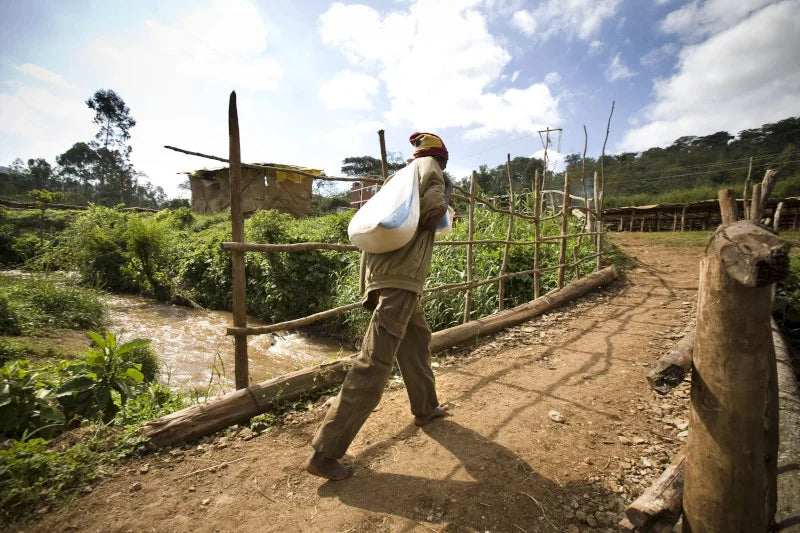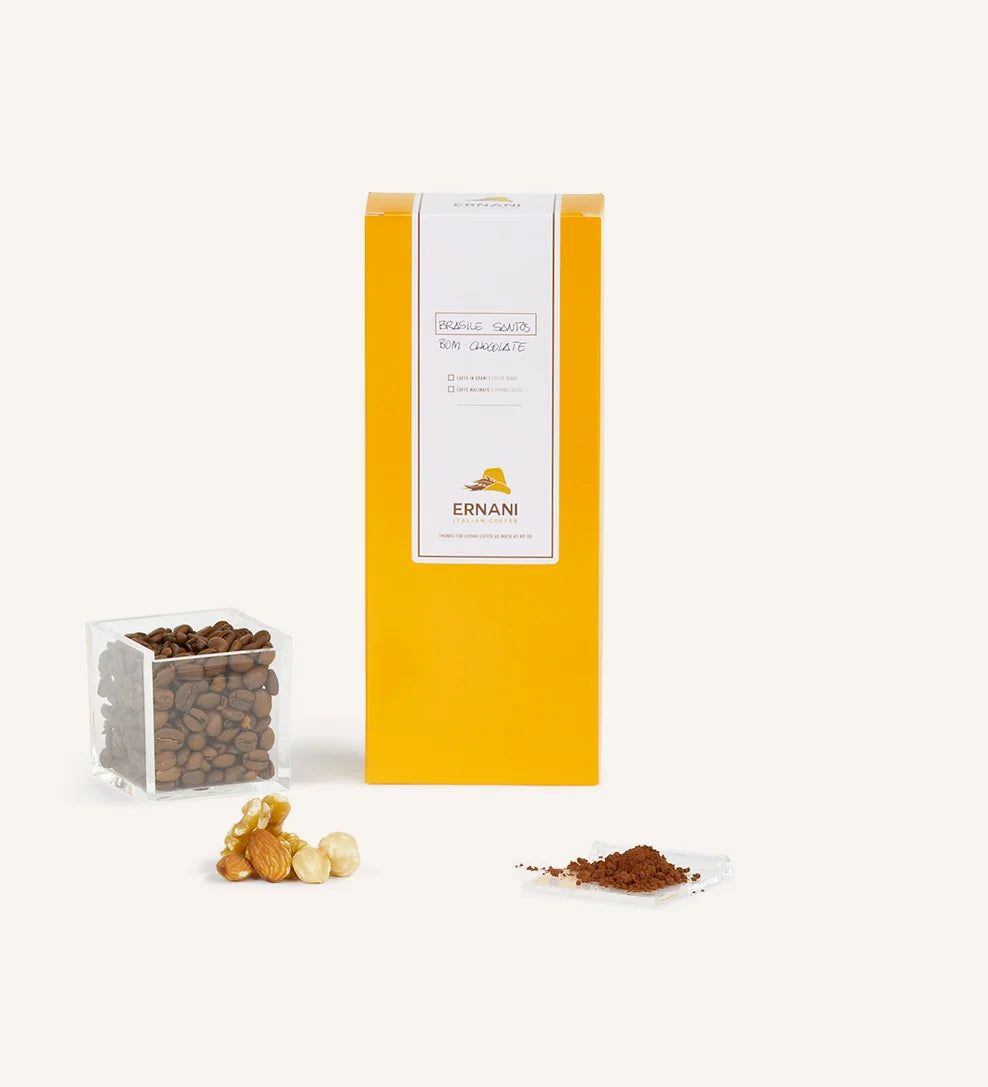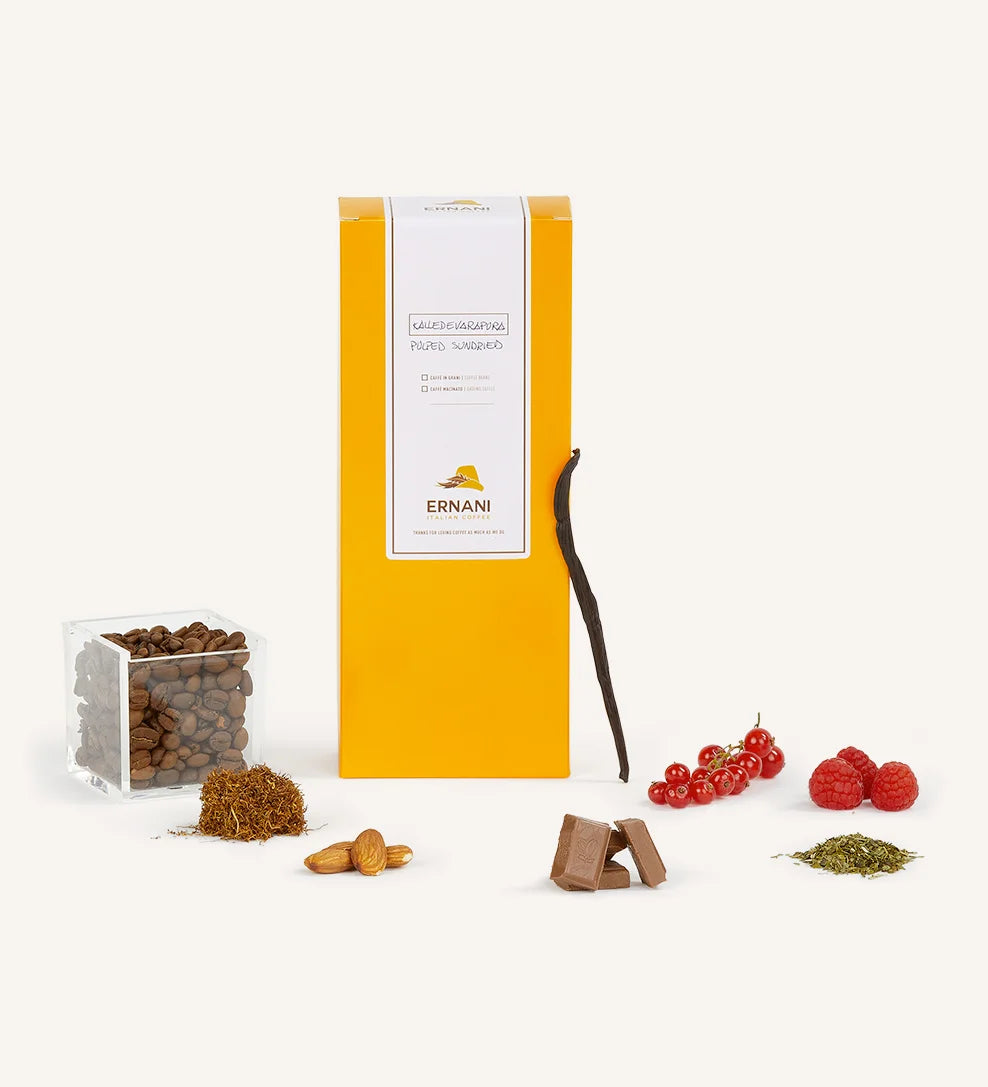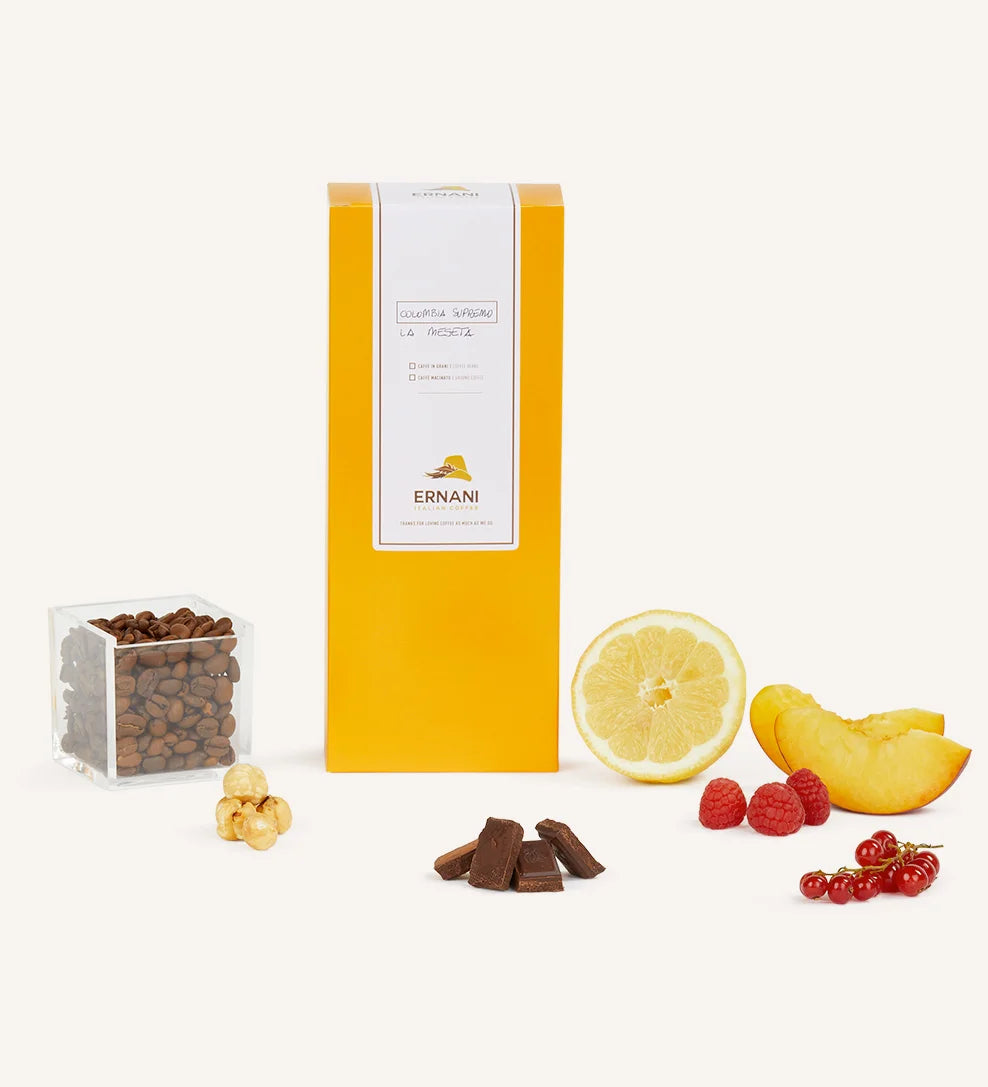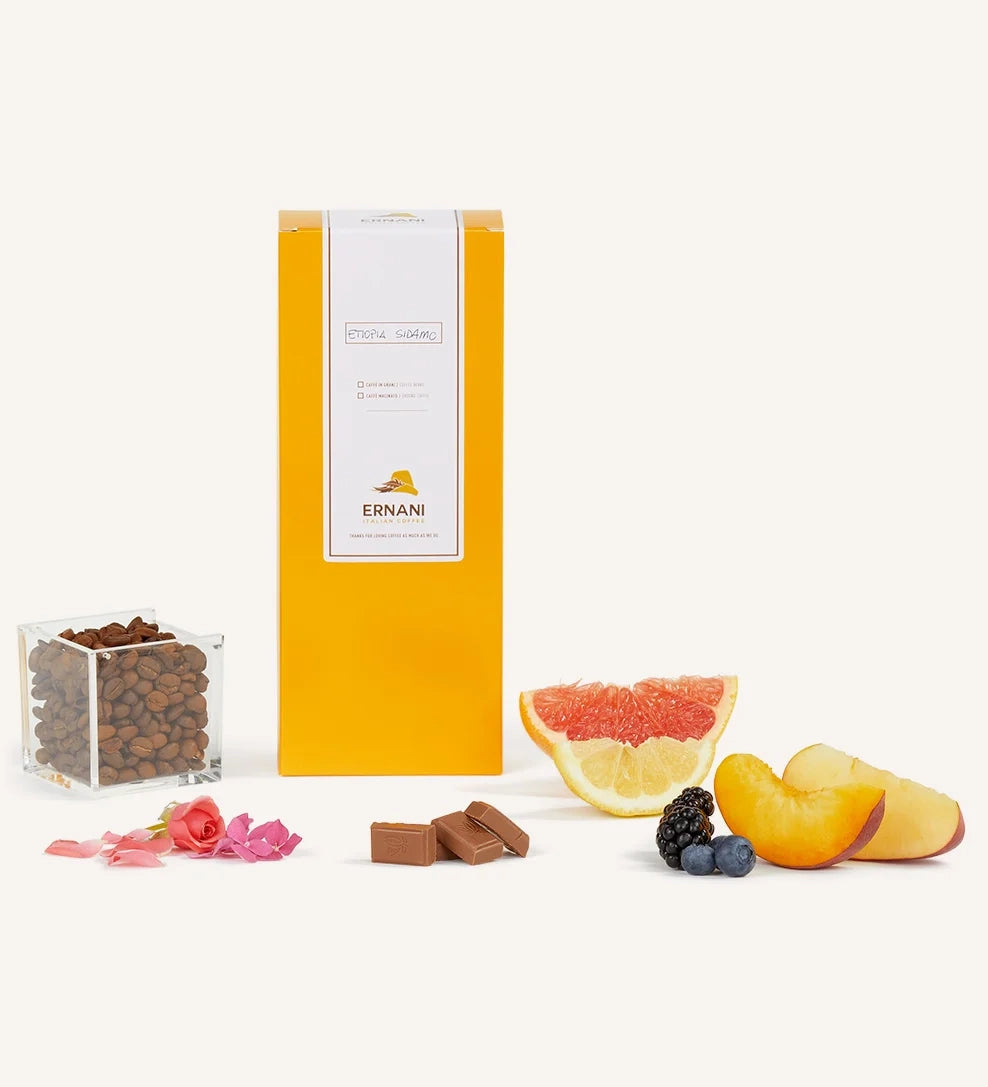
Etiopia Sidamo - 250g
Save up to 10% by choosing periodic delivery
Description
A fresh, citrusy and floral single origin, driven by a pleasant and soft acidity.
The single-origin Ethiopian Sidamo is a gourmet Arabica coffee, grown at an altitude of about 1,800 metres above sea level.
The fruits are harvested using the picking method, i.e. manually, selecting only cherries that are perfectly ripe. They are then processed using the washed method, which gives the extracted beverage a bright acidity.
- On the nose: intense aromas of citrus and flowers, together with a sweet note of white chocolate.
- Taste: different aromas stand out from time to time, starting with a marked acidity reminiscent of bergamot, followed by sweeter notes of red fruits, apricot, milk chocolate and almond. Finally, there is a delicate bouquet of flowers and tea leaves, accompanied by fresh and pleasant spices. There is no bitterness whatsoever.
Ernani's advice: for espresso, use a dose of 9g per dose.
Suitable for
For those seeking a fine, delicate, and fresh blend that encompasses the qualities and aromas of 4 different single-origin coffees.
Technical data sheet
- Aromatic notes: blackberry, pink grapefruit, honey, white chocolate and almond
- Intensity: 6.5/9
- Body: 4/9
- Sweetness: 4.5/9
- Bitterness: 2/9
- Acidity: 7/9
- Aromatic intensity: 6.5/9
- Roasting: medium
- Composition: 100% Arabica
- Origins: Ethiopia Sidamo washed arabica, Colombia Finca la Meseta washed arabica, India Kalledevarapura washed arabica, Brazil Bom Chocolate natural arabica
Thanks to the medium roast, the carefully selected raw coffee beans can express themselves to their fullest, releasing all their natural aromas without ever being overly bitter. Try it without sugar, it's incredible!
The coffee is stored inside a sealed bag, self-protected with a one-way valve, which allows the coffee to degas, preventing oxygen from entering, which would otherwise oxidize it. This keeps the coffee fresh and aromatic even after several months.
Notes for the 1kg grain pack:
- Roasted coffee beans
- 1000 g net weight
- Packaged with one-way valve
Notes for the 250g grain pack:
- Roasted coffee beans
- Packaged in a protective atmosphere of food-grade nitrogen with a one-way valve
- 250 g net weight
Notes for the 250g ground pack:
- Coffee beans roasted and then ground
- Packaged in a protective atmosphere of food-grade nitrogen with a one-way valve
- 250 g net weight
History of coffee
Today we travel to Ethiopia, the native lands of the magical roasted bean.
Legend of the discovery
The coffee plant originated in the south of the state, in the Sidamo region, growing spontaneously among the wild trees of the forest.
Legend has it that it was Kaldi, an Ethiopian shepherd, who first discovered this incredible fruit.
Thousands and thousands of years ago, a shepherd on the Kaffa plateau in Ethiopia named Kaldi noticed that his goats, besides being more stubborn, headstrong, and obstinate than usual, were also very nervous, becoming upset at the slightest thing, and charging headlong at anyone who approached them. A great restlessness also reigned within the herd, marked by a constant clashing of horns. But what seemed even more serious to the shepherd was the fact that, come evening, when he chased the goats into the stables, the animals were always restless and wouldn't rest. In the middle of the night, they were all still awake.
Unable to understand this unusual phenomenon, the shepherd from the Ethiopian plateau went to a monastery and explained the matter to a wise old monk, who asked whether the shepherd had recently changed pastures and whether the goats had grazed on some plant they were not used to.”
In one of the first versions of the legend, brought back to Europe by Naironi in 1671, the theme of the initial rejection and condemnation of the new "drug" by the institutions in force at the time is present:
Kaldi, noticing a stimulating effect on his flock as they grazed on the bright red berries of a shiny green shrub, tried chewing the fruit himself. His excitement persuaded him to take the berries to a Muslim holy man in a monastery. But the priest condemned their use and threw them into the fire, which released a tantalizing aroma. The roasted beans were immediately plucked from the embers, crumbled, and dissolved in hot water to make the first cup of coffee.
It all began here: the cup of steaming beverage came to life, and we discovered the potential of this plant and its aromatic beans. This is where ours and all the other traditions spread around the world began.
Coffee has always had a sacred meaning in Ethiopia, becoming an integral and indispensable part of the country's economy, politics, rituals, language... in short, of its entire way of life.
In fact, in addition to making up 2/3 of the state's revenue, it has generated important and, above all, fascinating historical rites and ceremonies.
The coffee ceremony
The coffee ceremony in Ethiopia follows a precise ritual, placing great importance on conversation and human relationships.
It is performed three times a day, by the housewife in a white dress with colored edges, serving three rounds of coffee to each participant, and each round has its own meaning.
The beans are still roasted by hand, just like in the old days, using a pan placed directly over an open flame, constantly stirred by the same woman. The brown beans are then ground and left to infuse in a traditional coffee maker.
Seeing coffee prepared in this way and with all this care, calm, and attention is moving and makes us understand how sometimes in our Italian culture we take it for granted and don't pay the right attention when tasting it.
Bringing it back, on some special occasions, to a true ritual can make us experience the moment as something of pure taste, peace, tranquility and pleasure.
For this reason, for our Ethiopian Sidamo we recommend extraction in a filter, Chemex, or V60, to fully enjoy this moment and savor the flavor of the magical African land.
Find out how to make coffee with the V60.
Coffee area
Coffee in Ethiopia is truly considered a small, great miracle of nature, as there are no large plantations in the area, but rather the fruit of the labor of many small producers and local families who often grow the plants directly in their own "backyards." These small farmers number approximately 12 million.
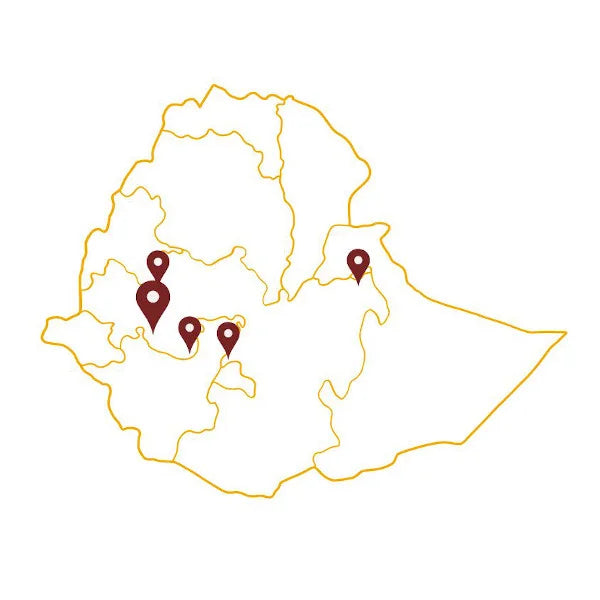
They are usually located in the following territories:
- Sidamo, the region where our single origin coffee also comes from, in the south of the state, which produces exceptional coffees with a marked acidity, including the Yrgacheffe and Guji regions;
- Harrar, the driest and almost desert-like area of the country, where one of the oldest varieties is grown: Ethiopian Harrar;
- Limu and Djimmah, the western area of the country where coffees processed using the washed method are called Limu and the natural ones are called Djimmah.
Coffee trees in Ethiopia grow at altitudes between 1,500 and 1,800 meters, but sometimes reach altitudes as high as 2,200-2,400 meters above sea level!
Since everything is very domestic, the growers do not use chemicals or substances toxic to the environment, leaving the soil pure and free to breathe, positioning the coffee plants in the shade of other crops and tall trees.
All this makes Ethiopian coffees one of the most prized in the world, with aromatic, intense and flawless beans.
On the palate, it presents fresh and delicate aromas of citrus, red fruits, and flowers, along with spicier notes or hints of chocolate and dried fruit. The sweet notes are often traced back to honey and caramel.
So, wouldn’t you like to try a steaming cup of Medium-Light Roast Ethiopian Sidamo from Caffè Ernani right now?
Have a good trip!
Curiosity
Here are some Ethiopian proverbs or expressions about coffee:
“Buna dabo naw” or “Coffee is our bread!” used to remind themselves of the importance of this food in their lives;
“Buna teto” or “Drink coffee” used as a way of saying “Good luck” or “Everything will work out.”


